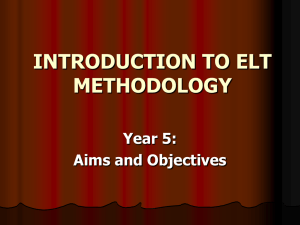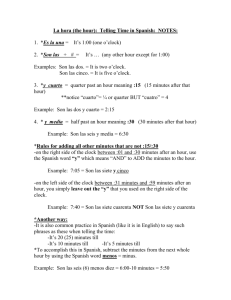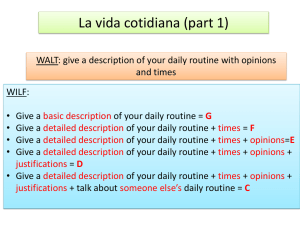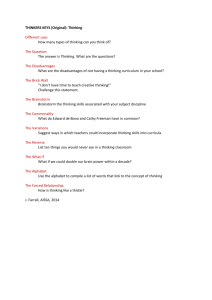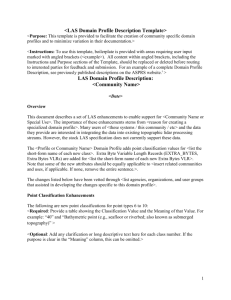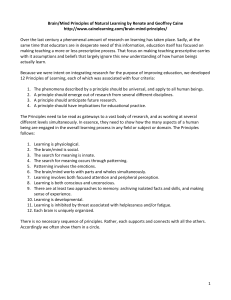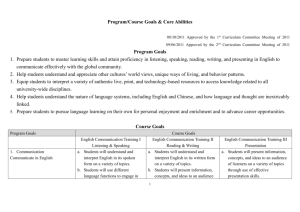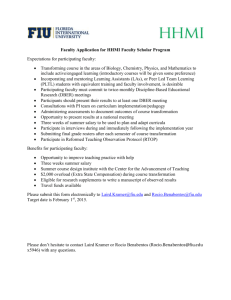Final Exam Study Guide
advertisement
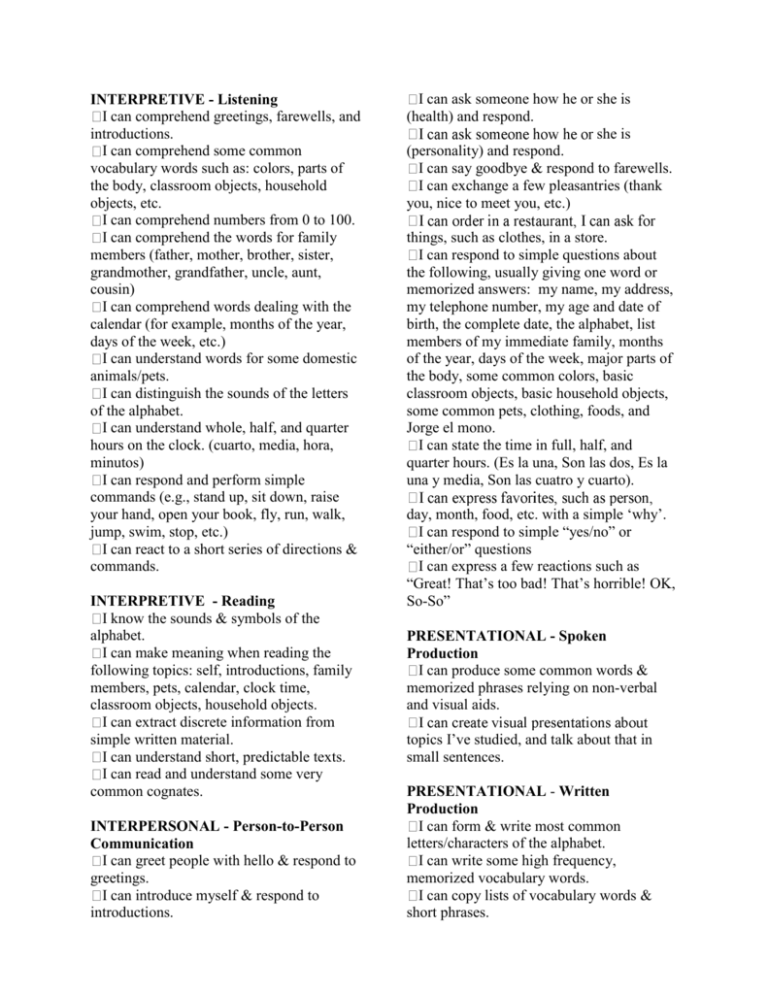
INTERPRETIVE - Listening I can comprehend greetings, farewells, and introductions. I can comprehend some common vocabulary words such as: colors, parts of the body, classroom objects, household objects, etc. I can comprehend numbers from 0 to 100. I can comprehend the words for family members (father, mother, brother, sister, grandmother, grandfather, uncle, aunt, cousin) I can comprehend words dealing with the calendar (for example, months of the year, days of the week, etc.) I can understand words for some domestic animals/pets. I can distinguish the sounds of the letters of the alphabet. I can understand whole, half, and quarter hours on the clock. (cuarto, media, hora, minutos) I can respond and perform simple commands (e.g., stand up, sit down, raise your hand, open your book, fly, run, walk, jump, swim, stop, etc.) I can react to a short series of directions & commands. INTERPRETIVE - Reading I know the sounds & symbols of the alphabet. I can make meaning when reading the following topics: self, introductions, family members, pets, calendar, clock time, classroom objects, household objects. I can extract discrete information from simple written material. I can understand short, predictable texts. I can read and understand some very common cognates. INTERPERSONAL - Person-to-Person Communication I can greet people with hello & respond to greetings. I can introduce myself & respond to introductions. I can ask someone how he or she is (health) and respond. she is (personality) and respond. I can say goodbye & respond to farewells. I can exchange a few pleasantries (thank you, nice to meet you, etc.) things, such as clothes, in a store. I can respond to simple questions about the following, usually giving one word or memorized answers: my name, my address, my telephone number, my age and date of birth, the complete date, the alphabet, list members of my immediate family, months of the year, days of the week, major parts of the body, some common colors, basic classroom objects, basic household objects, some common pets, clothing, foods, and Jorge el mono. I can state the time in full, half, and quarter hours. (Es la una, Son las dos, Es la una y media, Son las cuatro y cuarto). day, month, food, etc. with a simple ‘why’. I can respond to simple “yes/no” or “either/or” questions I can express a few reactions such as “Great! That’s too bad! That’s horrible! OK, So-So” PRESENTATIONAL - Spoken Production I can produce some common words & memorized phrases relying on non-verbal and visual aids. topics I’ve studied, and talk about that in small sentences. PRESENTATIONAL - Written Production I can form & write most common letters/characters of the alphabet. I can write some high frequency, memorized vocabulary words. I can copy lists of vocabulary words & short phrases. How to study for the final exam? Think about it…all of the statements on the other side of this paper are “I can” statements. YOU must be able to do these tasks without an I-Pad, or copying from a neighbor. These words and phrases MUST be in your head. Strategies? How do you learn best? How do you get math into your head? Or what about all those songs you sing without looking at a piece of paper or I-Pad? You learn everyday, you need to be aware of how YOU learn best. Suggestions: 1st – Know lots of words. (Know = I can see it and apply the Spanish word) 2nd – Make Meaning; Put those words into short sentences (Meaning = use it). Example: el perro BECOMES El perro marrón y amarillo es feroz, ¡Cuidado! 3rd – Exchange information with a classmate or the teacher. Ask him/her questions. S/he does the same of you. 4th – Role Play – just like we did with the Restaurant Dialogue, when you worked with a partner and presented to me, you could do for all the topics on the other side of this paper. 5th – Use your resources: The Realidades textbook, Spanishdict.com, Hello-Hello, 123Teachme.com, NotesinSpanish.com, and hundreds more. 6th – Responsibility – I suspect that those of you not passing on to Spanish II will be those who have spent time sleeping, daydreaming, doing another class’ work, and generally not paying attention. When you were 0 – 3 years old, you were a captive audience, you absorbed language because you had to, it meant survival. 7th – Language 1 vs. Language 2 – You can’t translate everything word for word. Other languages, their words and sentences, are structured differently. KEY WORDS: At a minimum you should be able to use and understand these words in a variety of contexts to manipulate your environment. These will complement ALL the other words you kno Mi nombre es ______ Mi _______ favorito es _________ Mis __________ favoritos son _________ Me llamo ______, Se llama ________ Puedo _____ Quiero _______ Vivo en _____, Vive, Vivimos, Viven Me gusta ______ Me gustan ______ Me encanta ______ Me encantan ______ Tengo, tiene, tenemos, tiene Estoy ______ Soy ________, Soy de ______ Me gustaría ________ Hablo, habla, hablamos, hablan Debo, debe, debemos, deben Como, come, comemos, comen Bebo, bebe, bebemos, beben Tomo, toma, tomamos, toman Corro, Salto, Camino, Nado, Paro, Vuelo, Veo, Miro, Escucho, Oigo, Hablo, Como, Bebo, Escribo, Estudio, Leo, Pongo, Llevo, Me queda, Me quedan Cuesta, Cuestan Que asco, Ni manera, Quizás, Es posible, Por supuesto, No sé, No me importa, Que horrible Los animales (de casa, slavaje, mascotas) Las comidas (saludables, insalubres) Los Miembros de la familia alto, bajo, mediano, gordo, delgado, fuerte débil, feo, hermoso, guapo, inteligente, tonto, cariñoso, amable, malo, simpático, guay Los ojos, la nariz, la cabeza, la piel, el pelo, el cuerpo, las manos, los brazos, las piernas, La ropa (all we’ve studied)
